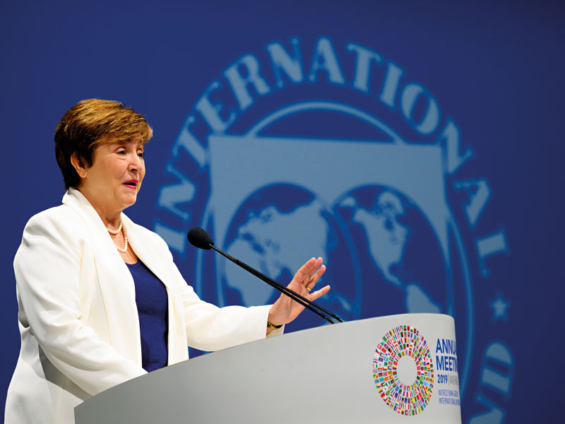The International Monetary Fund (IMF) has doubled down on its plea to wealthier nations to support Ghana and other weaker economies to help such countries extricate themselves from the shackles of debt.
The call also comes at a time when the fund has seen a $1. 6 billion shortfalls in its funding in the face of the seemingly global economic crises where funding to debt-distressed countries was at its highest.
Speaking ahead of the IMF and World Bank Spring Meetings in Washington, Kristalina Georgieva, the
IMF’s Managing Director said the fund and wealthier countries needed to make it easier for vulnerable ones to restructure their debts to help minimise the effects of the debt crises on lives and livelihoods of their people.
Developed economies must also commit more resources to the fund’s Poverty Reduction and Growth Trust (PRGT) – a concessionary lending window for low-income countries (LICs) – to help strengthen the global response to debt vulnerabilities, Ms Georgieva said in a curtain raiser speech before the meetings that opened yesterday, Monday, April 10.
Ghana’s case
The one-week meetings in Washington D.C. in the United States of America (USA) come off at a time when Low-Income Countries (LICs) are battling extreme debt pressures worsened by the COVID-19 pandemic and Russia’s invasion of Ukraine. Ghana, with a debt stock of GH$575.7 billion in November last year, is one of more than 10 LICs in debt distress.
The country defaulted in servicing its debt last year and is now working with bilateral creditors to restructure their component to be able to earn a US$3 billion IMF assistance to help slow down inflation, prop up the currency and return the economy to the path of growth.
Although discussions with some bilateral creditors under the G20 Common Framework are underway, talks with China, which holds US$1.9 billion of Ghana’s debts have dragged, fuelling doubts over the country’s ability to secure a package before May.
Costly delays
The IMF MD said such delays to debt restructuring requests were costly to the countries and the global economy in general, hence the need for additional support from wealthier countries for these “weakest members of our global family.”
“I wish to make a double plea on their behalf: help them to handle the burden of their debts, which has been made so much harder by the shocks of the past years; and secondly, help ensure that the IMF continues to be in a position to support them in the years ahead. Start with debt”, she pleaded.
About 15 per cent of low-income countries are already in debt distress and another 45 per cent face high debt vulnerabilities. And about a quarter of emerging economies are at high risk and facing “default-like” borrowing spreads.
This has raised concerns over a potential wave of debt restructuring requests—and how to handle them at a time when current restructuring cases are facing costly delays, Zambia being the most recent example,” she said.
Zambia started its debt restructuring in December 2022 but the inability to reach a consensus with China largely means that the process is yet to be concluded.
Stronger support
Beyond this, Ms Georgieva said the IMF needed more resources from wealthier nations “to bolster the IMF’s capacity to help our poorest member countries.”
“To support them, we have increased our interest-free lending more than four-fold to US$24 billion since the beginning of the pandemic. Now, we are urgently calling on our wealthier members to help address fundraising shortfalls in our PRGT,” she said.
In April 2020, the fund disbursed US$1 billion to Ghana under its Rapid Credit Facility (RCF) of the PRGT to fight the COVID-19 pandemic and its effects.
It said earlier this year that increased demand by countries hit by the twin effects of the pandemic and the war in Ukraine meant that the PRGT faced funding shortly of about US$1.6 billion.
As a result, Ms Georgieva said support from wealthier nations was critical to ensure that the IMF can continue to provide vital support and help catalyse financing from others.
“It is now more important than ever to step up cooperation—to strengthen the ropes that tie us together—on this issue and the full range of economic challenges, we face. Only then can we climb these hills together.
Growth
The IMF MD said global growth was also headed for the weakest since 1990.
She said as the debt pressures surged, the growth prospects remained subdued with the fund’s latest estimates showing that the global economy would grow below three per cent in the next five years.
“This makes it even harder to reduce poverty, heal the economic scars of the COVID-19 crisis and provide new and better opportunities for all,” Ms Georgieva said.
Latest Stories
-
Fire guts Kwadaso Wood market in Kumasi
6 hours -
GPL 2024/25: Gold Stars revive title hopes with win over Berekum Chelsea
6 hours -
We won’t entertain arrogant appointees – Deputy NDC Youth organizer warns
8 hours -
Akufo-Addo’s Aide-De-Camp in good shape after collapsing in Parliament
8 hours -
NPP notifies Parliament of its selected leaders for the 9th parliament
9 hours -
Dumelo loses father days before his swearing in as MP
10 hours -
NPP’s Mandamus Application: This is how the High Court ruled on 4 disputed constituencies
10 hours -
‘Forty Weeks and More’ premieres Jan. 18 on Joy Prime
10 hours -
GHANET urges caution against HIV during the new year festivities
11 hours -
High Court in Accra orders EC to re-collate results for Techiman South
11 hours -
NDC files notice of appeal after High Court ordered completion of results collation in 4 constituencies
12 hours -
2024 Election: South Tongu MP-elect gave Mahama the highest percentage of votes
12 hours -
Daily Insights for CEOs: Mastering time management as a CEO
12 hours -
Kantamanto Market fire: Strengthen investigations or expect more fire – Dwamena-Aboagye
12 hours -
Belgian Foreign Minister to lead EU delegation to John Mahama’s inauguration
12 hours

